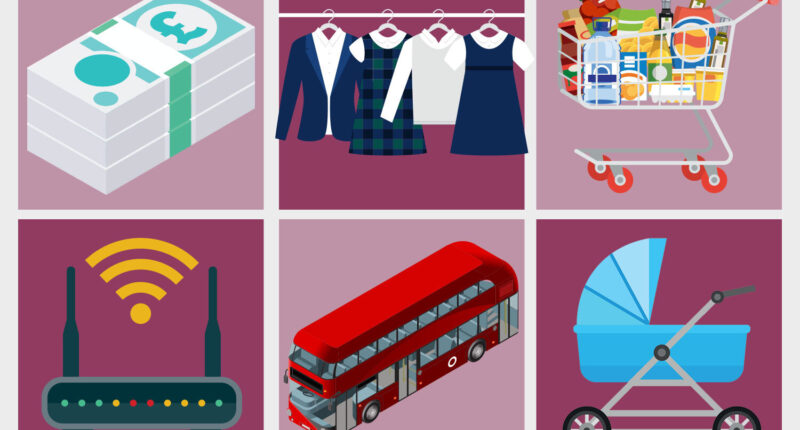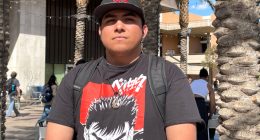STRUGGLING households on Universal Credit and other benefits could get freebies on top of their usual payments.
With bills and costs continuing to rise, it’s important that you’re taking advantage of all the help that’s available to you.
From food and supermarket vouchers, to bill discounts and cash for school uniforms, we’ve rounded up some of the extra support that is available to people on Universal Credit and benefits.
The exact help you can get depends on your circumstances, but isn’t necessarily just for those on benefits.
If you were eligible for them all it could give you a boost of up to £6,938.
Below we explain how each one works, who can get it and how to claim.


Household Support Fund – up to £1,000
Struggling households can claim free cash via the government’s Household Support Fund (HSF).
The scheme was first brought in in 2021 with the aim to help support vulnerable households.
Currently, it’s worth £842million and the pot of cash has been shared between councils in England.
Those councils then decide how to distribute their share of the fund among residents.
Most read in Money
That means what you can get depends on where you live.
In many cases, help is offered to households on benefits or a low income, but that’s not always the case.
Help includes free cash, grocery vouchers, or white goods.
The amount you are entitled to will vary depending on the area you live in too and each council will have a different application process.
To find your local council, use the gov.uk council finder tool.
For example, residents living in Torridge can get between £600 and £1,000 and thousands of residents in Cornwall can get £160 in support.
Meanwhile those living in Medway in Kent, can apply for up to £210 in support and in Bracknell there’s £390 of supermarket vouchers being handed out.
Bear in mind that some councils haven’t opened the application process for the current round of funding as it was only renewed in April.
Free childcare – £1,630
In a change that was introduced earlier this week, childcare costs will be paid upfront for many parents and the amount they get will rise.
It’s a huge win for The Sun’s Make Universal Credit Work campaign, and around 120,000 families on Universal Credit who are eligible for childcare payments will benefit.
The amount of cash parents can claim has gone up from £646 to £951 for one child, and from £1,108 to £1,630 for two – an increase of £522.
But it’s important to note that while the new rates come into force on Wednesday, most won’t see their payments rise until August.
Parents may also be able to take advantage of other childcare support, whether you’re claiming Universal Credit or not, including up to 30 hours free childcare.
Cost of living payment – £150
More than six million people will get a one-off £150 cost of living payment paid straight into their bank accounts by July.
The payment is meant to help with the extra costs disabled people in particular often face, such as care and mobility needs.
The tax-free cash is being dished out until July 4.
You have to be receiving certain benefits to qualify for the £150 cost of living payment. These are:
- Disability Living Allowance
- Personal Independence Payment
- Attendance Allowance
- Scottish Disability Benefits (Adult Disability Payment and Child Disability Payment)
- Armed Forces Independence Payment
- Constant Attendance Allowance
- War Pension Mobility Supplement
A small number of people will see the £150 land in their accounts after July 4.
This will apply if you were awaiting confirmation of your eligibility for the qualifying benefits on April 1.
School Uniform grants – £100s
Families struggling with the cost of living can get £100s in free cash to help pay for school uniforms.
Local councils have the authority to provide parents with grants to help them buy skirts, trousers and more under the Education Act 1990.
But there’s no legal obligation for them to offer help so what you are entitled to can be a postcode lottery, plus you might not get any help at all.
Scheme eligibility and availability can vary depending on where you live so it’s worth checking what’s available where you are.
While there is no exact criteria for receiving a school uniform grant, they are typically available to people on benefits such as Universal Credit, Jobseeker’s allowance and Child Tax Credits.
Children who qualify for free school meals will usually also qualify for school uniform grants as well, so long as your council offers grants.
What you can get depends on where you live, as there’s no statutory duty to offer grants across the whole of the UK.
Meanwhile, households in Scotland can get grants worth up to £120 for each primary school age child and £150 for every secondary school age child.
In England, what you can get will vary depending on what council area you fall under.
The best thing to do is contact your local council to see if you can get any help, and then find out what the application process involves.
Social tariffs – around £256
Another scheme benefits claimants could take advantage of is social tariffs for broadband.
Around one million people cut off their broadband in the last year due to rising costs, according to recent research.
Those on certain benefits can save up to £256 a year on average, though the exact amount will depend on how much you pay now and the discount you get.
The average broadband bill costs £33.35 or £400 a year, according to the price comparison website MoneySuperMarket – so it’s worth checking if you can save with one of these cheaper contracts.
Some of the benefits that qualify you for a social tariff include: Universal Credit, Employment and support allowance and Jobseeker’s Allowance.
Among the providers currently offering social tariffs are: BT, Now, Sky, Virgin Media and Vodafone.
Ofcom has a list on its website of all the providers that offer the tariffs too.
Providers offer different packages, so it’s worth shopping around for the best deals.
Be aware that some suppliers may charge you a penalty if you leave a tariff mid-contract.
Always remember that the exact amount you’ll save by switching will depend on how much you were paying for your broadband before.
Energy bill grants – up to £1,500
Several suppliers offer energy bill help through hardship funds and give out grants.
These can be worth up to £1,500 and you don’t need to repay the cash.
British Gas has a hardship fund for struggling households – and you don’t have to be a customer to apply.
The cash can be used to pay off energy bill arrears, but you need to get debt advice first to be eligible – find out more about how to apply.
Other suppliers are also offering similar help to their own customers.
Check with yours directly to see what they offer. Eligibility and how much you get can vary between them.
Free prescriptions and dental treatment – £9.65
You could also get help with covering health costs, such as paying for your prescriptions and dental treatment.
To claim, you’ll need to show a copy of your Universal Credit award notice.
If you’re entitled to claim, you could get free NHS prescriptions, dental treatment, sight tests, wigs and fabric supports.
NHS prescriptions currently cost £9.65 in the UK.
You could also get help with the cost of glasses and contact lenses and money for travel costs for treatment.
The NHS has outlined more information on how to go about claiming here.
Sure Start grant – £500
Some new parents can get £500 in free cash through a pretty unknown scheme.
The Sure Start Maternity Grant is a payment that comes from the Government and issued to new or expectant parents.
The money is designed to help you cover the costs of having a child.
You usually qualify if you’re pregnant with your first child or are expecting a multiple birth (such as twins) and have children already.
Either you or your partner must also be receiving any of the below benefits:
- Income Support
- income-based Jobseeker’s Allowance
- income-related Employment and Support Allowance
- Pension Credit
- Child Tax Credit
- Working Tax Credit that includes a disability or severe disability element
- Universal Credit
You may also qualify if you are receiving Support for a Mortgage Interest loan.
Your income or the amount you get of any of these payments or benefits doesn’t matter but there are also exceptions to these rules.
For example, you can usually only get one of the grants if you have no other children under 16.
But you might be able to get the £500 if you are expecting twins, the child you’re caring for is someone else’s or you’re claiming for a family member who is under 16.
You can make a claim for the grant by filling in the Sure Start Maternity Grant (SF100) claim form.
You have to claim the grant within 11 weeks of the baby’s due date or within six months of its birth.
For more information head over to the government website.
Free travel and childcare when looking for work – £150
The Restart Scheme is designed to help those who’ve been on Universal Credit for more than a year and launched last year.
It can help cover the costs associated with finding a job, including travel, childcare and other expenses.
If you’re on the scheme ask the provider or your work coach about how to claim.
The Flexible Support Fund is a pot of money that has been put aside by the government to help you with the costs of getting a job.
The fund is managed by local job centres and can be used to cover the following costs of job hunting:
- Training for a job, up to £150
- Travel to interviews
- Childcare
- Tools for work
- Cost of medical evidence required by a disabled person
- Clothing and uniforms to start work
- Support for single parents in financial emergencies in the first 26 weeks of starting a job.
You can find out more about how to apply here.
The Jobcentre Plus travel card is available for free and cuts the cost of travelling on public transport, including buses and trains, by 50%.
If you’re on the scheme ask the provider or your work coach about how to claim.
The Flexible Support Fund is a pot of money that has been put aside by the government to help you with the costs of getting a job.
The fund is managed by local job centres and can be used to cover the following costs of job hunting:
- Training for a job, up to £150
- Travel to interviews
- Childcare
- Tools for work
- Cost of medical evidence required by a disabled person
- Clothing and uniforms to start work
- Support for single parents in financial emergencies in the first 26 weeks of starting a job.
You can find out more about how to apply here.
The Jobcentre Plus travel card is available for free and cuts the cost of travelling on public transport, including buses and trains, by 50%.
All train operators in England, Scotland and Wales accept the discount and cards are valid for up to three months.
But just because you’re on benefits, it doesn’t mean you’ll automatically get one – they’re handed out by Jobcentre staff on a case-by-case basis at the discretion of the work coaches.
To find out if you qualify for the boost, speak to your work coach at your nearest Jobcentre, which you can find via Gov.uk.
Help to save – £1,200
Not everyone is in a position to save, but of you are it’s worth getting a specific account that offers a generous bonus.
With the Help to Save account, anyone on Universal Credit can put away between £1 and £50 every month and you get a 50% bonus on top.
If you save the maximum amount over four years you can get a sum of £1,200 from the government, topping up your own savings of £2,400.
But you can still get some of the bonus even by saving a small amount – check out how it works.
Council tax discounts
Households up and down England saw their council tax bills rise by up to 15% earlier this year.
But you can get a discount on the bill if you are on a low income.
In some cases, you can even get your bill reduced to zero too, and with the average bill for a B and D home at £1,966, you could end up saving a massive amount.
The amount of discount you are entitled to varies depending on where you live, as local councils decide how to allocate them.
That means you have to apply through your local authority, which you can do on the Government’s website.
Healthy Start – £442
New or expectant parents can get up to £442 worth of free food a year through the relatively unknown Healthy Start scheme.
It’s open to anyone more than 10 weeks pregnant or with a child under four years old and on benefits.
If eligible, you are issued a Healthy Start card which you can use in a number of supermarkets and retailers.
You can use the card to buy plain liquid cow’s milk, fresh, frozen and tinned fruit and vegetables, fresh, dried and tinned pulses and infant formula milk.
You can also use it to purchase vitamins and vitamin drops for your baby or young child.
The maximum amount you can get your card topped up by is £8.50 a week, which totals £442 a year.
You will also normally need to be claiming one of the following benefits:
- Income Support
- Income-based Jobseeker’s Allowance
- Income-related Employment and Support Allowance
- Child Tax Credit with a family income of £16,190 or less per year
- Pension Credit
- Universal Credit with no earned income or total earned income of £408 or less per month for the family
However, you can also apply for the scheme if you are under 18 and not on any benefits.
Recent figures suggest over 200,000 parents across the UK are missing out on the help, so why not see if you’re eligible and save yourself some money.
For more on the scheme and how to apply you can go the government website.


Alternatively you can print out a paper form from the Healthy Start website or request one from your GP or midwife.
There’s also an option to request one from the healthy start helpline on 0345 607 6823.
Do you have a money problem that needs sorting? Get in touch by emailing [email protected].
You can also join our new Sun Money Facebook group to share stories and tips and engage with the consumer team and other group members.
This post first appeared on thesun.co.uk










